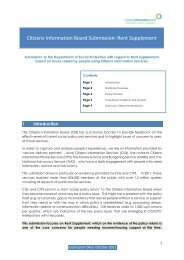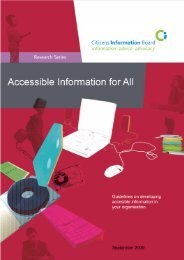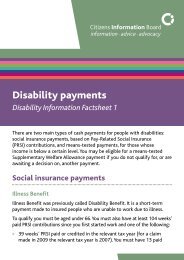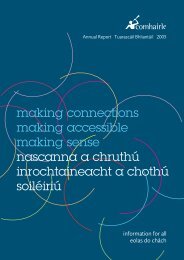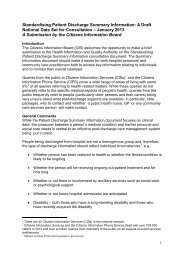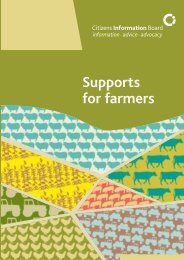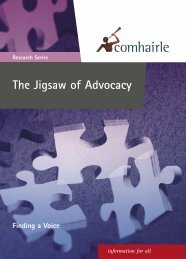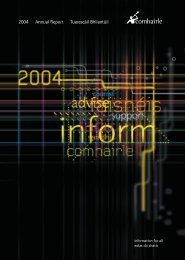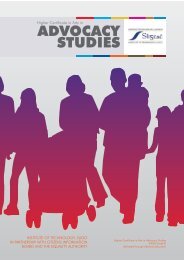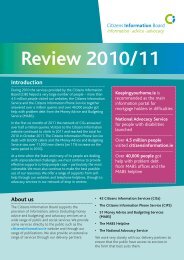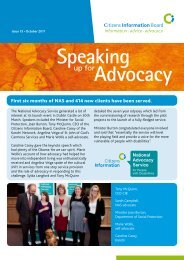Review of Sign Language Interpretation Services and Service ...
Review of Sign Language Interpretation Services and Service ...
Review of Sign Language Interpretation Services and Service ...
- No tags were found...
Create successful ePaper yourself
Turn your PDF publications into a flip-book with our unique Google optimized e-Paper software.
access to public services <strong>and</strong> the capacity to participate in civil society as a right.They point to the investment made in integrating access for people with physicaldisabilities into the environment, <strong>and</strong> want to see a commitment to access to signlanguage interpretation as a right. Many in the Deaf community saw therecognition <strong>of</strong> Irish <strong>Sign</strong> <strong>Language</strong> as the first language <strong>of</strong> Deaf people as a keymeans for ensuring that communication access becomes the norm.One public service provider raised the question <strong>of</strong> how to guarantee funding forinterpretation on a dem<strong>and</strong>-led basis in situations where the legislative provision isa discretionary provision, as in the case <strong>of</strong> the health services, <strong>and</strong> where there arecompeting dem<strong>and</strong>s for funding. Different solutions may be needed for differentorganisations, in line with their differing legislative frameworks.For Deaf people, <strong>and</strong> representative organisations, the strong view is that Deafpeople must be able to participate fully in all aspects <strong>of</strong> civil society, <strong>and</strong> thatprovision will be needed to make that participation possible.4.4.3 A scheme <strong>of</strong> entitlementsStakeholders discussed the ways in which a scheme <strong>of</strong> entitlements might bedelivered, <strong>and</strong>, again, a range <strong>of</strong> views was expressed. The possibility <strong>of</strong> anallocation <strong>of</strong> funding/hours <strong>of</strong> interpretation to an individual Deaf personregistered as having an entitlement (an allowance along the lines <strong>of</strong> the DisabilityAllowance concept) was raised as a possible way forward. However, some Deafpeople had concerns about such an approach, both in principle <strong>and</strong> in practice.The provision <strong>of</strong> a limited number <strong>of</strong> hours <strong>of</strong> interpreter time does not sit easilywith the concept <strong>of</strong> needs-led access <strong>and</strong> participation. At a practical level, thetransfer <strong>of</strong> the burden <strong>of</strong> administering the allocation could rest with the Deafindividual, <strong>and</strong> this would pose difficulties for many Deaf people who strugglewith poor literacy levels.4.4.4 Who pays?Closely allied to these issues was the question <strong>of</strong> who should pay forinterpretation for different purposes. There did not appear to be any question inthe minds <strong>of</strong> the Deaf community or public service providers but that publicservice providers should pay for interpretation to enable Deaf people to accesspublic services. However, there were differing views about payment for socialinterpreting, commercial services <strong>and</strong> payment for services in grey areas such asaccessing private healthcare. On the one h<strong>and</strong>, there was the view that sincecommunication is inherent in the business <strong>of</strong> daily living, an equality approachshould mean that Deaf people should not have to pay for interpreting in anycircumstances. Another view was that the debate about the precise nature <strong>of</strong>entitlement, <strong>and</strong> the scope for some means testing <strong>of</strong> entitlement, simply has nothappened in Irel<strong>and</strong>. Yet another view was that there would be scope for a mix <strong>of</strong>approaches including some provision for an allocation to individuals for socialinterpreting, alongside entitlement as <strong>of</strong> right for accessing public services.<strong>Review</strong> <strong>of</strong> <strong>Sign</strong> <strong>Language</strong> <strong>Interpretation</strong> <strong><strong>Service</strong>s</strong> <strong>and</strong> <strong>Service</strong> Requirements in Irel<strong>and</strong> • page 67



